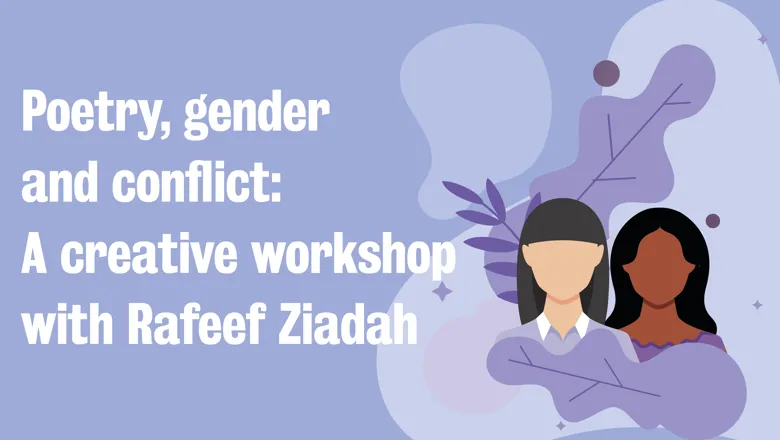Rafeef's emphasis on creativity and poetry as a way to move beyond news headlines to the realities of conflict particularly resonated with me.
Mary Hood, MA Science and International Security
25 March 2021
War Studies staff and students explored themes of gender and conflict through poetry
Students and staff took part in a creative poetry workshop, led by poet Rafeef Ziadah, for International Women's History Month.

Students and staff from across the Department participated in a poetry workshop to mark International Women’s Day and to explore issues around gender and conflict.
Led by Palestinian poet, academic and human rights activist Dr Rafeef Ziadah, the workshop explored war, security, and gendered violence both at home and in the wider world through the lease of poetry and free writing. The workshop also included live poetry performances from Rafeef and writing rooms, structured around prompts, which allowed students to compose their own free verse poems and expressions.
Poetry prompts included:
- Something an older relative gifted you
- A document that you take for granted
Rafeef also reflected on her own research of politics in the Middle East and the need to look at the subject of Security Studies through a feminist lens, in particularly how poetry and the arts can help build alternative archives structured around the lived reality of women in conflict zones.
This concept of poetry archives also highlighted Rafeef’s methods in using cultural production as an entry point to research, including centring different voices such as individuals left to rebuild communities post-conflict and those who experience intergenerational trauma.
Through her evocative and powerful poetry, Rafeef pushed us to reckon with the impact of conflict on people’s lives: be that intergenerational trauma or journeys of dispossession. Ziadah’s poetry performances were electric and there was hardly a dry eye on the screen.
Hillary Briffa, Lecturer in Defence Studies
Students were also invited to discuss borderlands, and the important story they tell of acceptance as well as the associated gendered violence towards refugees and asylum seekers in their journey towards and beyond legal documentation.
As a spoken word artist, Rafeef also gave students an insight into elements of oral poetic performance and traditional page poetry, of which often exist in tandem in many cultures, especially in storytelling and keeping accountability of events.
Mary Hood, MA Science and International Security student, shares her poem inspired by the prompt 'What item would you would take with you if you were forced to leave your home?'.
How do you choose
Just one thing
How do you pick
Just one memory
When the choice is not yours
I guess it becomes easy
When the choice is not yours
I guess it becomes clear.
How do you choose
When your life is not in danger
How do you pick
When the threats are far away
Why bother choosing
Your house is there tomorrow
Why bother choosing
Your life is easy and free
Ayesha Khan, Communications Officer, School of Security Studies, shares her poem using the prompt 'a document that you take for granted'.
I tuck my license into my pocket,
And set out upon the open roads,
That deliver freedom, new ventures,
New people, destinations unknown.
And as the sun lingers,
I feel its warmth on my skin,
And I know that home is not a place,
But a feeling.
And that feeling builds,
As I take junction and merge,
Left turn after right,
And with distance covered,
I clutch the wheel a little tighter,
Shift it up a gear,
And find flight in liberation.
